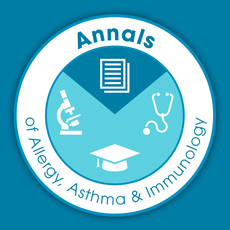 Memorial Day has passed and summer is upon us. I hope your May has been productive and exciting to you as you care for patients with allergy, asthma and immune-based diseases. This month’s issue of the Annals of Allergy, Asthma and Immunology, has a variety of features to pique your interest. I want to mention a couple of articles that you may not have seen yet but have considerable value, for your consideration.
Memorial Day has passed and summer is upon us. I hope your May has been productive and exciting to you as you care for patients with allergy, asthma and immune-based diseases. This month’s issue of the Annals of Allergy, Asthma and Immunology, has a variety of features to pique your interest. I want to mention a couple of articles that you may not have seen yet but have considerable value, for your consideration.
The first is a provocative article by several leaders in our field including Michael Blaiss, MD, FACAAI, Gary Steven, MD, PhD, FACAAI, Bruce Bender, PhD, Don Bukstein, MD, FACAAI, Eli Meltzer, MD, FACAAI and Tonya Winders, MBA who pooled their common interests and expertise to discuss the importance of and opportunities for shared decision making (SDM) in the allergist-immunologist’s office. They provide methodology on the how to’s of office-based SDM including specific resources available. They address ethical, practical, economic and psychological components necessary to implement and maintain effective SDM. The positive economic impact, patient satisfaction and, perhaps most of all, high quality clinical practice that SDM offers is thoroughly described. This is a must read for all clinicians.
Read all the Editor’s Choice articles from the May issue of Annals:
Another must read article is by Daphne Koines-Mitchel, PhD and colleagues from Brown University who posited a correlation between poor asthma control and poor performance in school. Indeed, they suggest that clinicians may counsel parents of children with asthma about whether poor academic performance could be from poor asthma control and whether inadequate asthma control could lead to poor academic performance. They studied this question in over 200 urban African American, Latino and non-Latino white children who had asthma. They found a heightened risk for poor academic outcomes in children with less controlled asthma. This correlated with absenteeism. The authors called for renewed efforts between school officials, parents and health care providers to optimize asthma treatment regimens and implement them in a consistent fashion.
Please let us know your thoughts about this issue and if there is something else you would like to see in the pages of the Annals.
Gailen D. Marshall, Jr., MD, PhD, FACAI
Editor-in-chief

